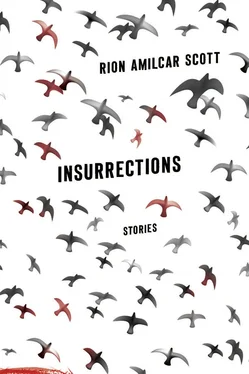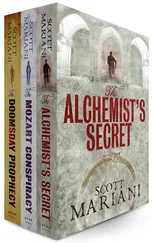We stepped out the door and I forgot to wonder why he wasn’t at work.
That was my fifty-seventh checkmate at my father’s hands. I refused to play with him after that and instead taught my little brother the game. He was six at the time and had a short attention span. I got tired of beating him, though. He never figured out how I could mate him in three moves.
Soon my father and I returned to the board. Around this time it became clear that my mother didn’t much like chess. She used to say things like, Chess ain’t gonna get your homework done. One night when she thought I was asleep I heard her tell my father, Chess ain’t gonna get you work. That was in the middle of a bunch of hollering from both of them. Then the front door slammed. My father was back in the morning to finish up the previous night’s game.
Sometime around the hundred-and-first checkmate, I cut through the park on my way home from a friend’s house late in the afternoon. There hung a sharp chill in the air. Around a picnic table stood a silent crowd looking severe and intense. Everybody pulled their jackets closer when the cold breeze blew in, but even as the heat left their bodies the people’s eyes stayed fixed on the game. Two guys — an older man with a white Afro and yellowish-brown tobacco stains soiling his white mustache and a younger man with smooth dark skin and thin, trimmed black hairs neatly resting on his upper lip — sat at the picnic table with its black graffiti on flaking maroon paint. The men were face to face, staring at a crumpled board more tattered than my father’s. A pale brown time clock sat near them, and after each move one of the men slapped a button atop the timepiece. The elder man had a grizzled face that looked as if it had been punched too many times, while his opponent’s was young, strong, and handsome, dimples passing over his cheeks when he flashed a transient smile.
Brilliant, a tall guy whispered loudly after the older man moved a pawn one square forward. Then a few minutes later: Man, fuck a Bobby Fischer. We got two Bobby Fischers right here. And these Bobby Fischers ain’t crazy.
From the chatter I learned that the younger man was Manny, his opponent was Chester, and nobody had ever seen anyone defeat either of them.
Eventually Chester pinned Manny’s king. He didn’t get up and dance. Manny didn’t rip the black hairs from his upper lip and storm off in anger. The two slapped hands, complimented each other, and left in opposite directions.
When I reached home, I told my father all about the match. Speaking breathlessly, I mixed up parts of the story and corrected myself into an incoherence I knew only my father could understand. And he did make sense of it, even if he had to ask me to slow down a few times.
I heard about them dudes, my father said.
We should go out to the park, Daddy. You can beat Chester.
Baby girl, chess ain’t about who can beat who; it’s about life. He unrolled the board and set up the pieces. Now come let me beat up on you.
It wasn’t until checkmate one hundred twenty-one, or perhaps one hundred twenty-two, that I convinced my father to come watch the men in the park play. It was a mild day, coming off a string of cold ones, and he agreed that it would be a shame to waste the shining sun and pleasant warmth by playing indoors.
When we got to the park, Chester sat blindfolded at a picnic table. He had three games going at once. He’d make a move and then a woman would guide him to the next table to make another move. The crowd looked on silently.
He’s just showing off, my father said.
You can beat him, can’t you, Daddy?
He’s a showboat, my father said as if he didn’t hear me. Chester vanquished an opponent and walked slowly to a different picnic table to make a move as another challenger set up a board for defeat. My father said, He a good showboat, though.
You can beat him, right?
My father grabbed my hand and we walked downhill, away from the action, to a maroon picnic table of our own. He unrolled the crumpled mat and set up the chipped pieces. I played with the black ones as usual. He said I could be white when I beat him. My father took one of my knights and taunted me.
Now, little girl, you know you can do better than that. You gotta protect them pieces, girl.
I took his queen and laughed at him. He clenched his jaw, and his whole face became tight. Playing my father was no longer as hard as it had once been. I was getting used to his rhythms and seeing weaknesses in the creaky stiffness of his gameplay.
Now where did you learn a move like that? he asked.
Don’t worry about me, worry about your game, I replied, which made him laugh.
We both hunched over the board. There was no world outside the both of us, outside of this game.
Hey, little lady, you missed a chance to take back the game from your old man, a voice called out. My father looked up and frowned. It was Manny. He sat on a nearby bench studying our board, his right hand rubbing against his smooth dark chin.
Move your queenside knight—
Come on, man, let me and my daughter play in peace.
All right, brotherman, I’m just saying that if I was her, I’d move that queenside knight so I could castle and set up some opportunities to put you in check, otherwise the game is over in three.
Whatever, man, worry about yourself, my father said. I hear Chester did you like that computer did that Russian.
Aw man, fuck Chester—
Could you have some respect for my little girl?
Sorry, man. I ain’t mean to disrespect the little lady. Let me play winner, Manny said, and then he winked at me. I smiled.
Staring at the board, I could see Manny was right. My father knew it. His annoyance showed in his stiff brow and the nests of wrinkles at the corner of his eyes. There was only one way out. But winning wasn’t as important as doing so gracefully and on my own. The knight stayed in his position and I moved a pawn instead, hoping to get it to the other side of the board before the game ended.
Aw, little lady, you just signed your death warrant, Manny said. Let me play winner.
Man, my father said, let the girl play. With a quick maneuver of his fingers he trapped my king. It stood there lonely and helpless, cut off from all its allies.
Checkmate! my father called with the drunken excitement of a midnight partygoer. You’re getting better, but you’re still not good enough to beat your old man.
My father gathered the pieces, snorting and grunting in a way that let me know he was pleased.
Come on, man, let’s go a round, Manny said with a dimpled smile.
Naw, man, I got to take my little girl home.
What you scared of? he asked.
My father barely even bothered looking up at Manny as he rolled his board and cradled it in the crook of his arm.
My dad’s not scared of you.
Looks like he is, Manny replied.
Come on, Daddy, you can play one game.
Naw, girl, we got to go.
Yeah, little lady. Y’all gotta go, Manny said. The way your pop plays, I’ll have him mated in two. He doesn’t want to embarrass himself in front of you.
My father unrolled the crumpled board and set up his pieces.
Manny removed a cigarette from the right breast pocket of his black leather jacket and made a ceremony of lighting it. Then he took a long pull and blew out a cloud of formless gray smoke.
I’ll even let you be white, he said.
It’s my board, boy. I’m the defending champion. You can’t let me be anything.
Turn your head, little lady. I’m ’bout to beat your daddy like he stole something.
They didn’t just play one game. They played three, my father staring into the crumpled board as if that vinyl square held an opening to the abyss and the chipped pieces were Satan’s own demons flying out to wreak havoc. He was so still at times it was as if he had become one of his chessmen. But his face tightened with each falling of his queen, his bishops, his knights; and it dropped each time Manny calmly said, Checkmate, and blew another plume of smoke.
Читать дальше












